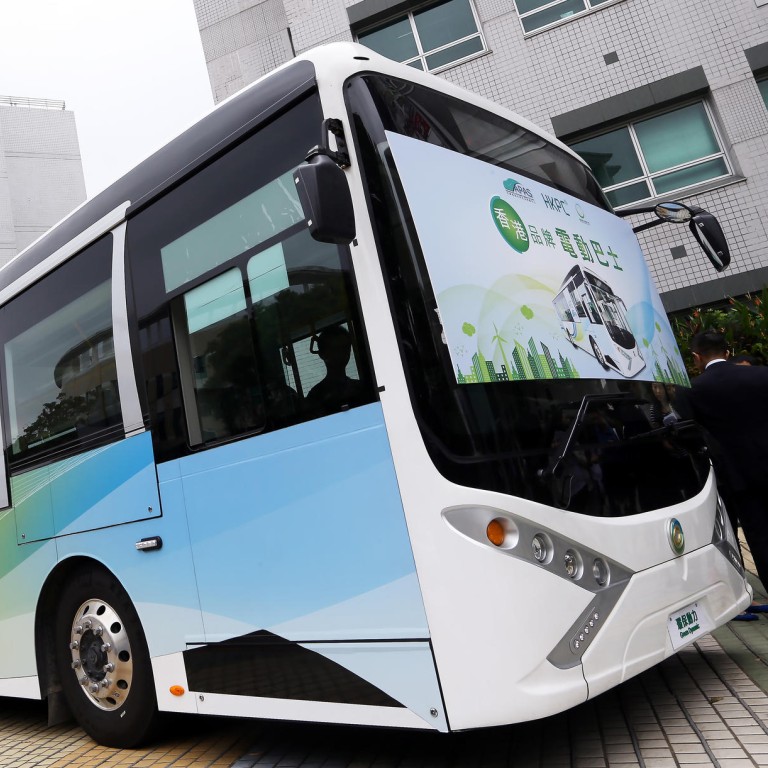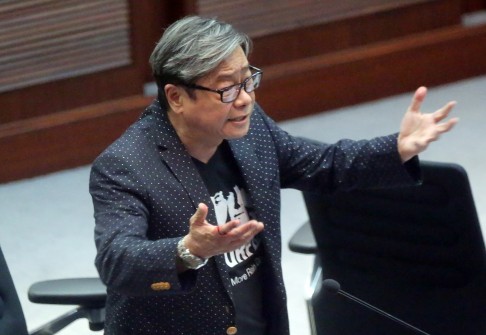
Letters to the Editor, November 09, 2015
I refer to the article, "First Hong Kong-designed electric bus rolls out for a month of test-drives on city's roads" (October 26). While the development team in Hong Kong should be congratulated for its accomplishments, it is misleading and naive to label the electric buses as "zero-emission", as an earlier report did ("Five more electric buses will be on Hong Kong's roads by end of year as city tries to reduce pollution", July 31).
It is well known that manufacturing electric vehicles involves the use of materials such as lithium, copper and refined silicon, the processing of which consumes more energy than building traditional vehicles powered by fossil fuel.
While the electric buses are manufactured in mainland China, their impact on the global environment should not be overlooked.
In addition, electric vehicles can be considered clean only when the electricity consumed by them is clean. In Hong Kong, however, over 53 per cent of electricity comes from burning coal, a cheap but dirty energy source, and 22 per cent from natural gas, which also generates a large amount of greenhouse gases, according to a recent report of the Environment Bureau.
To solve the problems of traffic congestion and air pollution, the city needs to invest in and accommodate self-driving vehicles, a technology that can address the two leading causes of traffic congestion in Hong Kong: the excessive number of vehicles and competing use of road space. By removing human drivers, the most error-prone factor, from the vehicles, fewer accidents would occur on the road and the average speed of vehicles would increase dramatically.
As self-driving vehicles can operate 24 hours a day, seven days a week, the number of vehicles that the city needs will also decrease significantly.
In contrast to electric vehicles that create a false impression of environmental friendliness, self-driving technology is the real game changer that may offer the ultimate solution to the city's problems of traffic congestion and air pollution. The government and the people of Hong Kong should think ahead and get ready for this disruptive but exciting, new technology.
In her letter "Dogs are a nuisance in public housing" (November 4), Linda Ng Lai Yin has brought up the root of the problem: dogs are not the real nuisance, it's the anti-social people who own them.
The problem is widespread. Litter louts abound: they toss rubbish onto the pavement and from speeding cars, and the sea is sickeningly full of it. Does no one remember the severe acute respiratory syndrome outbreak?
What does the government do? Do they take away litter bins in the hope that people will take their litter home with them, or ask members of the public to considerately pick up litter for them?
Where are the litter wardens giving on-the-spot fines? Where are the CCTV cameras to collar the culprits? Where are the heavy fines to hit these litter bugs where it hurts most?
As for residents of public housing estates, if they cause a nuisance and don't clean up after their dogs, then we should name and shame, and introduce a three-warnings-and-you-move-out policy.
It is unfair to responsible dog owners living in public housing to tar them with the same brush as their irresponsible neighbours; they don't deserve to be penalised. Anti-social behaviour should be dealt with but not by depriving decent people of the right to own a dog.

I refer to Alex Lo's article ("Wong's 'question' was just dead wrong", October 24).
I agree with Mr Lo that the Legislative Council is a garbage council but I strongly disagree that Wong Yuk-man is a garbage lawmaker.
The local legislature fails to perform its functions properly. Under the Basic Law, the powers of Legco members to introduce bills are very limited. The existence of the functional constituencies (largely elected by the business sectors) and the "split voting" system ensure that the interests of the business elites and the Beijing loyalists prevail over the public interest.
I think Mr Wong is one of the best incumbent lawmakers. He is familiar with government policies and articulate in delivering speeches in council meetings. He is bold enough to criticise government officials.
Indeed, he was elected in 2008 and re-elected in 2012 as a lawmaker to challenge the administration.
Rude as Mr Wong may seem to be in asking Chief Executive Leung Chun-ying when he would die in the question-and-answer session, Mr Wong has the popular mandate to do so. In the political context, one would interpret that Mr Wong was asking when Leung's political life would come to an end. The question itself reflects the public dissent against the chief executive.
I agree with Ms Seto Ka-yan that tutorial classes have a negative impact on students ("Beware the downside of extra study", November 1).
Attending tutorial classes is definitely time-consuming and a waste of money.
Most of these classes last two hours, but students can keep their focus for only about an hour. After an hour, they will start to play with their electronic gadgets.
If remedial classes are needed, the schoolteacher should organise them because they are most familiar with the students' progress, and the supplementary exercises they set will be most useful.
External tutors will teach methods and skills to help students get a good result in exams, but the students may not understand why they need to use this method or the other to solve the question.
Most importantly, we have to face the yearly exams and later the Diploma of Secondary Education exam on our own. Our tutors will not accompany us to take the exam, so we can't rely on them too much.
I am writing about our city's shameful organ donation rate. What's missing from the current debate is how empathy can help solve the problem.
The death last month of teenager Jamella Mangali Lo, who waited in vain for a double-lung transplant, highlighted the ineffectiveness of the existing organ donation system. Only 2.4 per cent of the Hong Kong population are registered as potential donors.
Some have called on the government to review the system, while others have suggested improvements, such as by implementing an opt-out scheme.
Yet what must change is people's attitude. No matter what scheme is adopted, the number of organ donors won't increase if people are indifferent and apathetic. They can still choose to turn a blind eye to the long waiting list.
The responsibility does not lie with the government alone. While it should promote awareness of the donation programme, we as citizens should also take the initiative to register ourselves as donors.
Hongkongers are often criticised for being money-minded and lacking in neighbourly love. It's high time we showed our love and care for others.
The Postmaster General's proposal to perform "cultural cleansing" on a few dozen Hong Kong postboxes has attracted much comment in these columns.
She ought to know that the royal cipher on postboxes has caused controversy before.
The current British monarch is referred to as Her Majesty Queen Elizabeth II. However, the well-known first English queen of that name predated the Union of the Crowns. Thus in Scottish eyes, the present queen is in fact the first Queen Elizabeth. After her ascension to the throne and the introduction of an "ER II" cipher on postboxes, rabble rousers took to vandalising postboxes in Scotland. John MacCormick, then in the esteemed role of rector of the University of Glasgow, and the nationalist Ian Hamilton brought a suit against the crown in the Court of Session.
They lost the case, but the response of the Royal Mail nonetheless was to remove the cipher on all new postboxes in Scotland and instead use the Scottish crown. An example of this is today seen in Hong Kong's Statue Square.
Thus, Scotland, like Hong Kong, moved on from using royal ciphers. Nonetheless, old postboxes were retained and many fine examples are extant. An especially fine one, visitors to Scotland may care to view, is the Victorian pillar box next to the Festival Theatre in Edinburgh.

